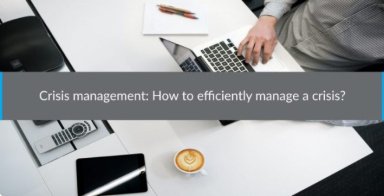
Publication number: ELQ-55558-1
View all versions & Certificate

How to Efficiently Manage a Crisis
A step-by-step guide to help you efficiently manage a crisis.
Introduction
You know that sooner or later your business may face a crisis. It can be caused by internal problems (such as a succession of resignations, a loss of an important client or the absence of a manager) or by external factors (economic crisis, natural disasters, shortage of raw materials, transport strikes…).
No matter what the origin of the crisis, the consequences can be catastrophic for the company and jeopardize its future. To avoid this kind of scenario and effectively manage any type of crisis, it is essential to react quickly and take adequate measures to get your business out of the turmoil.
Even though there is no miracle solution to effectively manage a crisis, you can follow these 7 steps to set up a feasible crisis management plan.
- Step n°1 |
Identify Risks
Good crisis management starts with anticipation of risks that a company may face. Organise a brainstorming session and gather representatives from all departments in order to create a complete list of all potential risks. These can range from a natural disaster to a computer crash, including a work accidents, cyber attacks or defective products.
Next, analyse every risk to determine its probability of occurring and its impact on the organisation; then establish a ranking. With this in-depth study, you will realise that some risks can be avoided by modifying work processes and changing the current practices. As an example, you could reduce the risk of cyber attacks by investing in efficient antivirus software and by regular cyber security related trainings provided to your employees. - Step n°2 |
Define an Action Plan
Once you have identified potential risks, you need to define human and material resources to be put in place in order to respond effectively in every crisis situation. A crisis management plan takes into consideration all possible scenarios and provides for operational responses. It may include a Business Continuity Planning (BCP), Business Recovery Plan, evacuation plan, etc.
It is important to be well prepared and to have a response plan ready before a crisis occurs. Why? As you are likely to react differently (less efficiently) under pressure when having to deal with a real crisis situation.
Note that a crisis management plan must be revised and updated regularly as risks are prone to change. It must also be tested to ensure its effectiveness.


